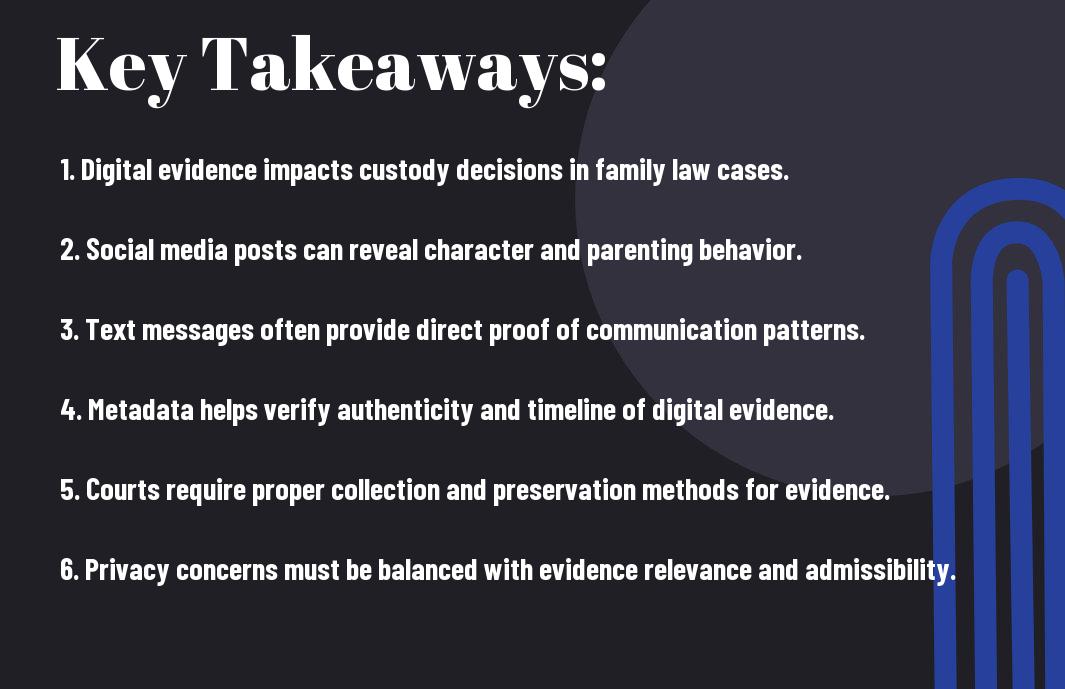Many individuals navigating family and custody disputes may not realize how pivotal digital evidence can be in their case. Your social media posts, text messages, and other digital communications can significantly impact the outcome of custody arrangements or divorce proceedings. Understanding how to collect, present, and analyze this evidence is necessary for substantiating your claims and protecting your rights. By harnessing the power of digital evidence, you can better advocate for your interests and ensure that your voice is heard during these challenging times. Our specialists at Digital Forensic Squad are proficient in assisting you with gathering detailed digital evidences for your custody case.
Key Takeaways:
- Digital evidence from social media, texts, and emails can play a significant role in establishing behavior patterns and parental fitness in family and custody disputes.
- Litigants should be aware of their digital footprint and the potential implications of their online presence, as posts and messages can be scrutinized in court.
- It’s advisable to consult with legal professionals who understand the nuances of digital evidence to effectively utilize or challenge such information in custody cases.
Understanding Digital Evidence
Your comprehension of digital evidence is necessary in navigating family and custody disputes. In today’s interconnected world, various forms of digital interactions can serve as valuable resources or potentially detrimental evidence in legal scenarios. Recognizing how to effectively leverage this information is key in advocating for your rights and interests.
Definition and Importance
Against the backdrop of evolving technology, digital evidence encompasses all electronic data that can be used to support or refute claims in legal disputes. Understanding its importance lies in its ability to provide unbiased records of communications and interactions, which can significantly impact the outcome of a case.
Types of Digital Evidence
An extensive array of digital evidence can be classified under the following categories:
| Type | Description |
|---|---|
| Social Media Posts | Statements and images shared publicly that reflect your situation. |
| Text Messages | Private conversations that may display communication patterns. |
| Emails | Formal communication that can document agreements or disputes. |
| Voicemails | Recorded messages that may contain vital information. |
| Photos and Videos | Visual evidence that can substantiate claims or allegations. |
This range of digital evidence can enhance your case and provide necessary clarity in the proceedings.
In fact, each category of digital evidence has unique attributes and implications that can be leveraged in custody disputes. You may find it valuable to explore the following:
| Type | Importance |
|---|---|
| Social Media Activity | Reflects lifestyle, parenting capabilities, and relationships. |
| Text Message Exchanges | Offer insight into interactions and possible conflicts. |
| Email Correspondence | Can provide evidence of agreements or disputes. |
| Recorded Voicemail | Captures communications that may otherwise be overlooked. |
| Photographic Evidence | Visual records can support claims of lifestyle and home environment. |
This variety of evidence, when properly utilized, can serve as a significant advantage in your case.

Social Media in Custody Disputes
The role of social media in custody disputes is increasingly significant, as it provides a window into your everyday interactions and lifestyle. Judges and family law attorneys often consider social media content when evaluating the wellbeing of children and parental fitness, making it vital for you to be mindful of what you share online during ongoing custody disputes.
Relevance of Social Media Posts
On many occasions, social media posts can serve as evidence in custody disputes, shedding light on your character, parenting style, and the overall environment provided for your children. These posts can illustrate your involvement in your children’s lives or highlight any behaviors that may raise concerns about your parental fitness.
Privacy Concerns and Legal Implications
Behind the convenience of sharing your life on social media lies a web of privacy concerns and potential legal implications. Content you voluntarily post may be subject to scrutiny in court, exposing you to possible misinterpretations or manipulations of your words and actions.
Media platforms offer a dynamic lens into your personal life, but sharing your experiences can have serious ramifications. It’s important to assess what you post, as incriminating evidence can arise from your accounts. Consider the potential for misinterpretation of a seemingly innocent photo or comment, which could impact the custody arrangement adversely. Engaging with family law professionals can help you navigate these legal pitfalls and protect your interests while maintaining your privacy.

Text Messages and Communication Records
Once again, text messages and communication records can serve as vital pieces of evidence in family and custody disputes. These documents not only reveal your interactions but can also reflect emotional states and intentions. The context captured in these exchanges can provide valuable insights into the dynamics of custody arrangements, showcasing instances of support, conflict, or disinterest that may impact court decisions regarding parental rights.
Collecting and Analyzing Text Evidence
Messages exchanged between you and the other party can serve as significant evidence in court. It’s important that you carefully gather and organize these texts, as they can reveal patterns of behavior and communication styles. Ensure that you preserve the original timestamps and context to maintain their authenticity. Analyzing these exchanges might also help identify factors affecting your case, such as any threats or indications of neglect.
Impact on Parental Fitness and Decision Making
Parental communication patterns can significantly influence perceptions of your fitness for custody. If your text messages demonstrate a stable, supportive, and cooperative attitude, they can enhance your credibility in court. Conversely, evidence of negative interactions, such as hostility or lack of effective communication, can raise concerns about your willingness to co-parent effectively.
And it’s vital to understand that these interactions are scrutinized by the court for direct implications on decision-making. Negative text exchanges displaying anger, disrespect, or inability to cooperate could lead the court to view you as unfit for custody. On the other hand, maintaining positive communication and demonstrating your ability to issue support can significantly enhance your case. The quality of your interactions provides the judge with a window into your parental fitness, ultimately influencing custody decisions. Therefore, you should maintain a focus on respectful communication, as it influences not only your relationship with the other parent but also impacts legal perceptions of your parenting abilities.
The Role of Email and Digital Documentation
Now, as you navigate family and custody disputes, understanding the significance of email and digital documentation is vital. These forms of communication can serve as necessary evidence in court, showcasing interactions that relate to custody, support, and co-parenting arrangements. For insights on how digital platforms influence family law, check out Social Media’s Role in Family Law Proceedings.
Emails as Evidence in Family Court
Role of email communications cannot be understated in family court proceedings. Emails can provide a documented trail of conversations that can clarify misunderstandings or support claims regarding parenting responsibilities and financial obligations. Courts often consider such documented communications as reliable evidence, making them valuable assets in your case.
Organizing Digital Records for Legal Use
Below, you will find strategies for effectively organizing your digital records for legal purposes. Properly sorting these documents can significantly enhance your case’s presentation and outcome.
This process involves creating a systematic method for storing emails, texts, and other digital correspondence. For effective organization, establish clear folders categorized by date or topic, so you can quickly access relevant information. Utilizing digital tools such as cloud storage ensures that your records are protected and easily retrievable. Prioritize backing up your information to avoid any potential loss due to technical issues. By maintaining an organized digital archive, you can ensure that your evidence is not only accessible but also compelling for your legal proceedings.
Challenges in Presenting Digital Evidence
To navigate the complexities of family and custody disputes, you will encounter various challenges in presenting digital evidence. The vast array of digital formats and sources, including social media posts, texts, and emails, can complicate the process. Additionally, issues surrounding privacy rights and potential bias in interpretation may hinder your ability to use this evidence effectively. Understanding these challenges is key to ensuring that your digital evidence supports your case.
Authenticity and Admissibility Issues
Challenges arise when attempting to establish the authenticity and admissibility of digital evidence. Courts require you to demonstrate that the evidence is genuine and can be linked to the parties involved, which may involve validating the source and content of the data. This often entails technical knowledge or expert testimony to convince the judge of its legitimacy.
Overcoming Objections in Court
Any time you present digital evidence in court, you may face objections from the opposing party. These objections could challenge the relevance, authenticity, or potential prejudicial impact of the evidence. Effective preparation is necessary; you must anticipate these objections and develop arguments that underscore the evidence’s significance to your case.
Considering these objections, you should gather comprehensive documentation to strengthen your position. This includes seeking expert testimony to verify the authenticity of the digital evidence, showing consistent patterns or correlations in your data, and preparing to address potential prejudicial effects by contextualizing the evidence. Your ability to articulate the importance of the evidence in relation to your custody dispute will bolster your argument and may sway the judge’s perceptions.
Best Practices for Gathering Digital Evidence
Not every piece of digital evidence will serve your case equally, so it’s crucial to know how to gather the most relevant information effectively. Begin by identifying which platforms and messages may be critical to your dispute, ensuring that you capture screenshots, save conversations, and back up all relevant data. Organize your findings systematically to make them clear and accessible for your legal team.
Preservation of Evidence
Above all, ensuring the preservation of digital evidence is vital for maintaining its integrity during your case. Start by taking immediate actions to secure your data, such as saving texts, emails, and social media posts in their original format. Avoid altering any of the evidence, as this could impact its admissibility in court.
Collaborating with Legal Professionals
Around the gathering process, partnering with legal professionals can amplify the effectiveness of your evidence collection. Your attorney can provide guidance on what types of evidence will be most beneficial, ensuring you stay focused on valuable data. They can also advise on legal implications surrounding digital evidence, which can help safeguard your case.
Even with the best intentions, navigating the digital landscape can be complex. Legal professionals play a pivotal role in advising you on the types of digital evidence that can support your claims, ensuring you stay compliant with laws surrounding data privacy. Additionally, they can assist you in developing a strategy for presenting your findings. Utilizing their expertise not only enhances your approach but can also help avoid potential pitfalls and maximize the impact of your evidence in court.
Summing up
From above, it’s clear that digital evidence like social media posts, text messages, and emails can significantly impact your family and custody disputes. Understanding how to properly gather and utilize this information ensures that you present a strong case. Always consider both the content and context of digital communications, as they can influence your legal standing. By being mindful of your online presence and strategizing wisely, you can bolster your position in negotiations and court proceedings related to custody and family matters.
FAQ
Q: How can social media posts be used as evidence in family and custody disputes?
A: Social media posts can provide insights into a parent’s lifestyle, behavior, and relationships, which may affect custody decisions. Courts may consider the content and context of posts, especially if they demonstrate inappropriate behavior or negatively impact the child. Posts showing a stable environment, positive interactions with the child, or evidence of parental involvement can also be beneficial. It’s important that any evidence is relevant and admissible in court, so keeping documentation and context in mind is necessary. Contact Digital Forensic Squad to assist you with gathering of evidence legally so that they are admissible in court and strengthen your case.
Q: What types of texts or messages are typically submitted as evidence in custody cases?
A: Text messages can be valuable pieces of evidence if they document communication between parents about the child’s welfare, visitation arrangements, or any conflicts that arise. Messages that contain threats, harassment, or any behavior that substantiates claims of neglect or abuse are particularly significant. Additionally, texts showing cooperation and co-parenting efforts can also be presented to support a parent’s case for custody. Courts will assess the authenticity and relevance of these messages during the proceedings.
Q: Are there privacy concerns when using digital evidence in family law cases?
A: Privacy concerns are indeed important when handling digital evidence in family law cases. Parents must be cautious about how they obtain this evidence, as illegally accessed information may not be admissible in court. Moreover, using personal communication that was not intended for public viewing raises ethical questions. It is best to consult with a legal professional to ensure compliance with laws regarding privacy and evidence gathering. Proper collection and handling of digital evidence will help maintain its integrity for courtroom use.


